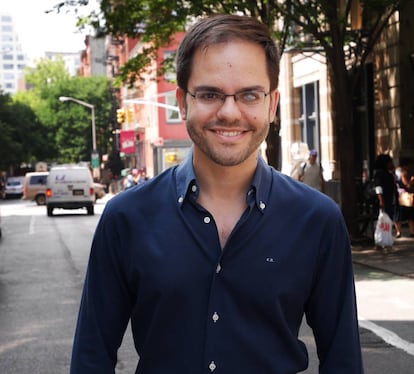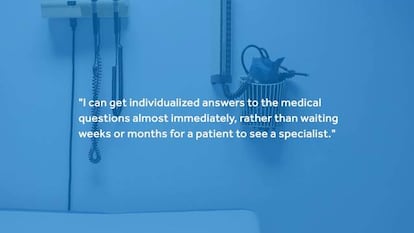The Spaniard with an app making US healthcare more affordable
Carlos Reines and US colleague’s RubiconMD gives GPs access to medical specialists
While the new incumbent of the White House invests time and energy in overturning Obamacare, a Spanish communications engineer and two US colleagues have teamed up to create an alternative that challenges President Trump’s ambition to rid the United States of the nearest thing to a national healthcare system the country has ever seen.

Founded in 2013 by Madrid-born Carlos Reines and Gil Addo, a Forbes Magazine “30 Under 30” in healthcare, RubiconMD offers US patients the chance to side-step costly appointments with medical specialists in a healthcare system renowned for its exorbitant fees.
An e-Consult platform, RubiconMD allows GPs to connect with first-rate specialists using telematics to verify a diagnosis and confirm patient treatment. Now, RubiconMD has just been endorsed by the prestigious Zuckerberg Hospital in San Francisco, which has joined forces with the initiative.
GPs say RubiconMD improves their practice and is like ongoing training Carlos Reines
With 24 employees, RubiconMD already operates in 32 states, serving health centers, company clinics and insurance companies. In 2016, it was used to either diagnose or treat one million patients, just three years after it was launched.
The cost for a general practitioner subscribing to the platform is $250 a month. This GP is then able to send patient details online to a medical specialist in one of more than 115 areas. An algorithm then selects the right specialist for the patient and the answer to the query comes back within four or five hours.
“Our specialists are people who have graduated from Harvard, Stanford and Columbia,” says Reines, 32, adding that 80% studied on scholarships and 60% now work in the best training hospitals in America.
“We want to make healthcare more democratic,” he explains. “We estimate that 40% of visits to specialists could be avoided if the family doctor had access to more information.”
Obamacare was introduced in 2010 and obliges all US citizens to buy medical insurance. The policy provides subsidies for people on low-incomes and supports companies that don’t discriminate against certain patients, such as those with a pre-existing illness. Obamacare also makes provision for the poorest sector of the population with the state health care initiative, Medicaid. Obamacare has provided 20 million more people with access to health care, paid for by raising taxes.

Trump’s proposal waives the obligation to buy medical insurance, radically changes Medicaid and removes the tax hike. RubiconMD is an option for the 14 million people who it is thought will be left without medical insurance next year if Trump’s reforms go through.
“I think the mission of making access to healthcare more democratic is more relevant than ever, given this new framework,” says Reines. “But even during Obama’s presidency, millions of patients had problems accessing specialists due to waiting lists, co-payments they couldn’t afford and trouble paying for transport. These problems are even more acute amongst the poorest Americans and that is where RubiconMD can have the biggest impact, by making access easier for more people and allowing them to bypass unnecessary fees.”
The most immediate effect of Trump’s proposal has been to generate uncertainty among practitioners, who are postponing decisions until the details of the new system become clear, but despite that, RubiconMD is managing to forge ahead.
Its partnership with the Zuckerberg Hospital and its associated university, the University of California in San Francisco (UCSF), has the added advantage that the latter is a pioneer in the development of digital consultations and has carried out research on the impact of these consultations on the quality of healthcare and treatment, according to Reines. “Together we have redesigned its model using RubiconMD technology, which has improved communication for doctors and medical teams and set a precedent when it comes to connecting academic hospitals and healthcare clinics, irrespective of location and the socioeconomic conditions of the patient,” he says. “Now we have many hospitals asking us to introduce similar models to their system, which means we are laying the foundation for our platform’s expansion.”
The Zuckerberg Hospital regularly uses telematics to access specialists. “We’re going to make it possible for any clinic that uses RubiconMD to do e-consultations with specialists from UCSF, starting with two departments and then expanding from there,” says Reines.
RubiconMD allows GPs to connect with first-rate specialists using telematics to verify a diagnosis
Besides nurturing the dream of transforming US healthcare provision, RubiconMD is also pleased with GPs’ response to the consultation tool. “They have told us that it improves the practice and they learn with it,” says Reines. “It’s like ongoing training.”
So how did Reines come to found a start-up that could change healthcare in the United States?
Having begun his career at Siemens Healthcare, he went on to head a division of Spain’s leading telecoms operator Telefónica as a telecommunications engineer. But he was keen to re-route to healthcare and so undertook an MBA at Harvard, where it became clear where his future lay.
“While I was in Boston I felt the need to do something that linked technology to healthcare, it’s something that’s always interested me,” he explains.
Meanwhile, Reines’s business partner, Gil Addo, a graduate from both Yale and Harvard, had a grandmother with a brain tumor who had to travel thousands of miles for treatment and follow-up support, inspiring him to come up with an alternative.
Among RubiconMD’s investors is the California Healthcare Foundation, which provides medical care to the lowest income earners on the West Coast. The company has also enlisted Nwando Olayiwola, the Director of the Center for Excellence in Primary Care and Associate Professor in the Department of Family and Community Medicine at University of California, as its Chief Clinical Transformation Officer.
English version by Heather Galloway.
Tu suscripción se está usando en otro dispositivo
¿Quieres añadir otro usuario a tu suscripción?
Si continúas leyendo en este dispositivo, no se podrá leer en el otro.
FlechaTu suscripción se está usando en otro dispositivo y solo puedes acceder a EL PAÍS desde un dispositivo a la vez.
Si quieres compartir tu cuenta, cambia tu suscripción a la modalidad Premium, así podrás añadir otro usuario. Cada uno accederá con su propia cuenta de email, lo que os permitirá personalizar vuestra experiencia en EL PAÍS.
¿Tienes una suscripción de empresa? Accede aquí para contratar más cuentas.
En el caso de no saber quién está usando tu cuenta, te recomendamos cambiar tu contraseña aquí.
Si decides continuar compartiendo tu cuenta, este mensaje se mostrará en tu dispositivo y en el de la otra persona que está usando tu cuenta de forma indefinida, afectando a tu experiencia de lectura. Puedes consultar aquí los términos y condiciones de la suscripción digital.









































